The Best Films of The Century | Group Chat
Blockbusters, Cult Classics, and Award-Winners Galore!
From time to time, Cinemantic’s four main contributors — Tyler MacQueen, Graham Piro, Caleb Boyer, and Daniel Mitchell — will jump on a call to chat about anything and everything movies. After the New York Times released its list of the 100 Best Films of the Century, we decided to discuss what our list would include. Each contributor had four picks. Vote below on which person you think drafted the best!
GRAHAM: With the first pick in the Cinemantics “Best Films of the 21st Century” draft, I’m going back to the beginning of the century: The Lord of the Rings: The Fellowship of the Ring. It’s arguably the most influential movie of the last 25 years. It shaped the Hollywood blockbuster for decades and captured a mythic spirit in a post-9/11 world, a sweeping story of good and evil, brilliantly told. I know it’s not the “film bro” pick, but it’s big, populist, and I think it’s one of the best films of the century.
CALEB: I love that pick.
DANIEL: It’s a great pick.
TYLER: Graham and I have had this argument a hundred times — and we’ll have it a hundred more — but I still think the elegiac tone of Return of the King hits harder.
DANIEL: I’m going smaller scale with Get Out. It’s one of the few horror films to fully break through into the Oscar conversation - four nominations, one win for Original Screenplay. Jordan Peele is one of our most promising directors, and I think the film reveals something new every time I watch it. Also, Daniel Kaluuya is just phenomenal.
CALEB: My first pick is No Country for Old Men. I think it is the most iconic neo-Western of the 21st century, maybe Hell or High Water is a close second. As an adaptation, it’s incredibly faithful to Cormac McCarthy’s novel. People often label McCarthy as nihilistic, and that’s not wrong, but I think there’s a thin vein of hope running beneath the despair. That comes through in Tommy Lee Jones’s final monologue, the dream about his father carrying a torch and going out into the deep, dark, cold to light a fire for him somewhere out there. It mirrors The Road in that way. You’ve got the father and the son, and what holds them together is the concept of them carrying the fire of humanity. I think the Coens translated it to the screen with such mastery. I just love that movie.
TYLER: That hopeful undercurrent is true of a lot of the Coens’ work, even in Miller’s Crossing, True Grit, and Hail Caesar. There’s always something beneath the cynicism.
DANIEL: Alright Tyler, you’ve got two picks back to back.
TYLER: First up: La La Land. To quote the opening number, it’s “a technicolor world made of music and machine.” Damien Chazelle modernized the classic Hollywood musical while paying loving homage to its roots. Gosling and Stone could easily become an all-time great pairing like Astaire and Rogers, and the songs are immaculate. But it’s the emotional core — the human cost of chasing dreams, of what you lose in the pursuit — that really lands. That ending sequence still hits me like a freight train, no matter how many times I see it. It’s just a beautifully constructed film.
DANIEL: I knew that was coming. And it’s a worthy pick.
TYLER: And now, for chaos: Walk Hard: The Dewey Cox Story. Hear me out… it might be the best comedy of the twenty-first century. Yes, other comedies could merit the title (Mean Girls, Anchorman, Tropic Thunder come to mind), but what makes this one stand out is its ability to skewer a well-established genre while also redefining how audiences interact with it. The metric of success? It’s now impossible to take any film in the music biopic genre seriously without thinking of this movie. Every beat in Rocketman, Elvis, and Bohemian Rhapsody — Walk Hard skewered them all first and, frankly, better. John C. Reilly gives a performance that is equally sincere and stupid, sings all the songs, and the jokes hold up nearly twenty years later. A total gem that deserves more love.
GRAHAM: A great parody needs to understand and respect what it’s skewering, and Walk Hard does exactly that. It really was the last gasp of the studio comedy era. Now everything’s either niche or buried on streaming. And it’s wild that Walk Hard flopped when it came out, but has grown such a loyal cult following since.
CALEB: I’d never seen it until Tyler showed it to me, and I became obsessed. Still quote it regularly: “Ma, I can’t smell anything.” “You gone smell-blind, son!”
DANIEL: Tyler might be its biggest evangelist.
CALEB: Yeah, it's so good. I love that movie. Okay, my next pick: Hereditary. I genuinely think it’s the best horror film of the century so far. It hit the way The Exorcist did in its time. Ask anyone what the scariest movie they’ve seen is, and most will say Hereditary. And I know that's the case for me, undoubtedly hands down the scariest movie I've ever watched. It is wild that it was Ari Aster’s debut. It’s not just terrifying; it has depth. The dollhouse imagery, the themes of fate and family, and the meticulous direction. It’s about people who lack agency, who are being manipulated by outside forces. It’s brilliant and deeply disturbing.
DANIEL: I’m going to be honest. It’s probably a no for me, dog. I haven't seen it, and I'm not sure I ever will.
GRAHAM: It pairs well with Get Out as part of that Prestige Horror wave. It also helped usher in the Blumhouse model, which features low-budget, high-return films that build buzz through social media and word-of-mouth, as seen with Long Legs last year. Hereditary became a phenomenon because it shocked people. And Aster really knows how to weaponize the frame. Those slow, creeping reveals are masterful.
DANIEL: Alright, time to shift gears from horror. My next pick is Once Upon a Time… in Hollywood. The neon lights flickering on to “Out of Time.” It's just pure dopamine. Tarantino recreates late-‘60s Hollywood with such affection. And not to mention, the breadth of Hollywood from the cast. Stacked top to bottom with past stars (Bruce Dern, Kurt Russell, Al Pacino), current stars (Leo, Brad Pitt, Margot Robbie) and the current slate of the next stars. Even those tiny roles — the Manson followers (shout out Dakota Fanning), the bit players — it just makes for a much richer Hollywood time capsule.
TYLER: Yeah, Mikey Madison, Austin Butler, Sydney Sweeney. It’s a time capsule of talent.
DANIEL: I think Inglourious Basterds might be more fun, but Once Upon a Time is his most mature film. It’s warm and nostalgic, but still delivers that classic Tarantino-violence right when it needs to. That ending is brutal, yes, but also deeply emotional. You realize this is a fairytale. Sharon Tate lives. Evil is punished. It’s wish-fulfillment through cinema, and it’s beautiful.
GRAHAM: It’s also part of this late-career Tarantino trilogy with Basterds and Django that rewrites history. These are movies that take real trauma and let us imagine another ending. Once Upon a Time is a hangout movie, a Hollywood elegy, and a revenge fantasy all in one.
TYLER: And that original music cue at the end when Sharon invites Rick in for a nightcap, it’s subtle but powerful. One of the rare times Tarantino doesn’t use a needle drop, and it works. Just a gentle reminder that this is fiction. In reality, she didn’t survive. But for a moment, the movies let her.
GRAHAM: Alright, I’m sticking to the post-9/11 theme with The Dark Knight. Alongside Fellowship, it’s one of the most influential blockbusters of the century. It changed superhero films, it redefined what audiences expected from “comic book” movies. And Heath Ledger’s Joker is arguably the most iconic performance of the last 25 years. The movie is just wall-to-wall memorable scenes.
TYLER: What The Dark Knight does brilliantly is what Donner’s Superman and Mangold’s Logan also understood: ground your superhero in a real-world genre. Donner gave us an American biblical epic, Mangold gave us a Western, and Nolan gave us a crime thriller, basically Heat with a cape. That’s why it works.
GRAHAM: It also tapped into deep cultural anxieties: surveillance, security, moral compromise. It’s a gripping action film and a reflection of the post-9/11 mindset. That’s why it holds up.
GRAHAM: For my next pick, I’m going with Zero Dark Thirty. Kathryn Bigelow crafts an incredibly tense, morally complex depiction of the hunt for Bin Laden. The final shot with Jessica Chastain alone on a plane, unsure of what comes next says so much. It’s a movie about obsession, about what we sacrifice in pursuit of vengeance. And despite what some critics say, I don’t think it endorses torture. I think it shows it, unflinchingly, and leaves you to wrestle with it. Easily the best War on Terror film we’ve had.
CALEB: I’ve had it on my watchlist forever. I know I need to sit down and watch it finally. But yeah, that runtime, man. Two and a half hours is no joke when you’ve got kids.
DANIEL: I’ll stay in the 2000s with a Fincher pick, not The Social Network, though that’s in the conversation. I’m going with Zodiac. It’s slow-burn, procedural perfection. Creepy, obsessive, chilling. You’ve got Jake Gyllenhaal, Robert Downey Jr., and Mark Ruffalo. It’s a serial killer movie, yes, but it’s also a movie about the need to solve the mystery, even when the answer never comes.
CALEB: Oh, great pick! Did Zodiac kick off some of our modern obsession with true crime in film and television? It was before the whole podcast boom. But that blend of real-world horror and narrative craftsmanship has aged really well.
TYLER: I can’t believe we’re this far in and haven’t picked an action movie.
CALEB: I’m glad you said that because my next pick is Mad Max: Fury Road. It’s pure cinematic adrenaline. It is a masterclass in action filmmaking with the practical effects, minimal dialogue, and the subtle but powerful use of CGI. George Miller basically reinvented his own franchise and reminded everyone what blockbuster filmmaking could be. It is an absolute acid trip! The sandstorm scene alone? Unreal. It’s one of those rare movies that genuinely feels like something you’ve never seen before, and that was my experience when I first saw it in the theater, besides maybe Blade Runner 2049.
GRAHAM: I think Fury Road set the standard. Everything else, even John Wick, is living in its shadow. Great pick.
DANIEL: When I am old and rich and own a movie theatre, it will be standard programming to have a showing of the 6-time Academy Award-winning Fury Road once a week.
TYLER: For my next one, I need a Spielberg. There are a lot of possible contenders — West Side Story, Minority Report, or more than likely Lincoln — but I’m going with The Fabelmans. Yes, it’s a $40 million therapy session. But it’s also the most insightful film we’ve had this century about the art form of cinema itself and how movies become a way to process the world. Spielberg, in his capacity as director and co-writer, shows us how a rickety 16mm camera helped him understand his family, his heritage, his pain, and his place in the world, in both good and bad ways. That shot with the camera reflected in the mirror during the divorce scene? Devastating. It’s not nostalgia, it’s reckoning.
DANIEL: That opening line — “Movies are dreams that you never forget” — that’s a line that has stuck with me. Tyler, we saw that one together, too, one of many!
TYLER: And that final sequence with David Lynch as John Ford? Pitch perfect. It’s a fairytale about the birth of a director and the first fifty years of Hollywood history, starting with Sammy watching Cecil B. DeMille and ending with that symbolic meeting between Ford and the next generation of filmmakers. Funny, strange, mythic.
TYLER: Alright, my last pick: Brokeback Mountain. I think it’s one of the most important romances of the century. It redefined the genre. Ang Lee takes the imagery of the American Western and uses it to tell a tragic love story, one that couldn’t exist openly. His restraint as a director mirrors the characters’ emotional repression. Lee is capable of incredible spectacle. Life of Pi proved that, but here he holds back, and it makes the heartbreak land even harder. Ledger, Gyllenhaal, Michelle Williams, and Anne Hathaway they’re all exceptional. It’s heartbreaking, beautifully directed, and culturally significant. A real turning point.
GRAHAM: It really is. It’s one of those rare films that you can say mattered in the culture. And it’s aged incredibly well.
CALEB: For my final pick, there has to be at least one animated film on our list. Spirited Away by Hayao Miyazaki. It came out in 2001, and it still stands as one of the most imaginative and emotionally rich animated films ever made. Miyazaki uses animation to explore adult themes through a child’s eyes — identity, loss, consumerism, environmental decay — all while crafting a dreamlike fantasy world. It’s bizarre, beautiful, and a delight. You can see his influence everywhere in Western animation and live-action films as well.
GRAHAM: Fantastic choice. And we definitely needed at least one animated film in the mix.
DANIEL: I still haven’t seen Spirited Away, but it’s been on my list forever. Is it too scary for kids?
CALEB: It's not intentionally scary, but it's just so weird and bizarre at times that kids might get scared. Some of his other films are more approachable, like Kiki’s Delivery Service. If you ever want to have your faith in humanity restored, that’s a wonderful film. Spirited Away is amazing too.
DANIEL: Okay, last pick. I’m going with Ocean’s Eleven. It might not be the most important movie of the century, but it’s definitely one of the most fun. The cast is pure charisma: Clooney, Pitt, Damon, Julia Roberts, Don Cheadle. The needle drops, the heist structure, the poker scene with early-2000s celebs — it’s a time capsule and a perfect vibe. Soderbergh followed up two Best Director nominations (and the win! in 2000) with this absolute banger.
GRAHAM: Great pick. It’s so satisfying to watch. Everyone in that movie is cool, charming, and impossibly good-looking. Just pure pleasure.
TYLER: When I went to Vegas last year, all I could think about was that soundtrack. That’s how ingrained Ocean’s Eleven is in my brain.
GRAHAM: Okay, last pick for me: The Florida Project. Directed by Sean Baker. It’s one of the most human, heartbreaking, and quietly powerful films I’ve ever seen. It tells the story of families living on the edge of society, just outside the gates of Disney World, and it does so with so much compassion and dignity. The performances — especially from the nonprofessional child actors — are incredible. Willem Dafoe is heartbreaking. That final sequence? Devastating and transcendent. It’s a small film that leaves a huge mark.
TYLER: That’s a curveball I did not see coming, but it’s a great pick. A perfect closer.
CALEB: I haven’t seen it, but I’ve heard it’s incredible. Adding it to the list now.






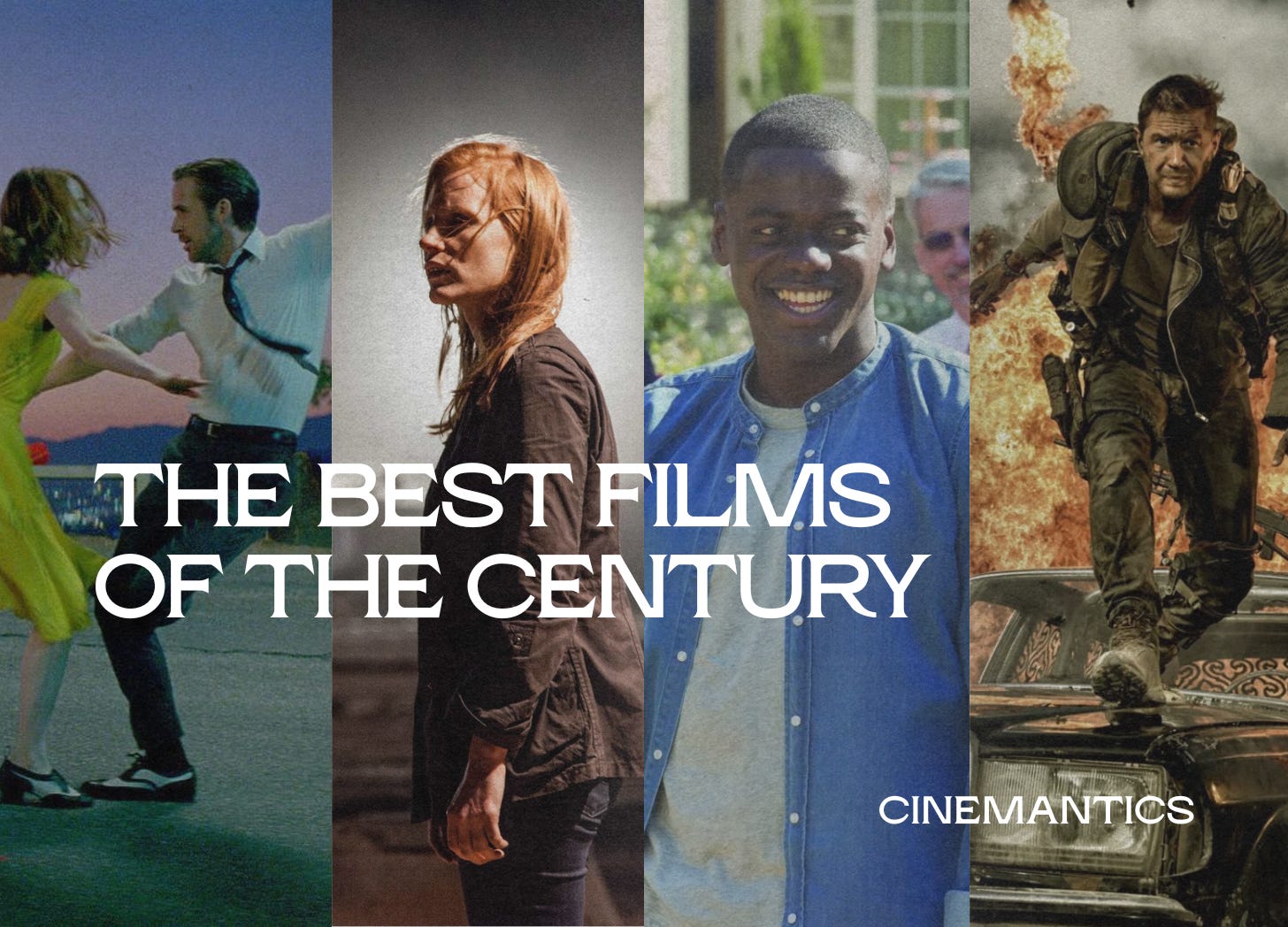
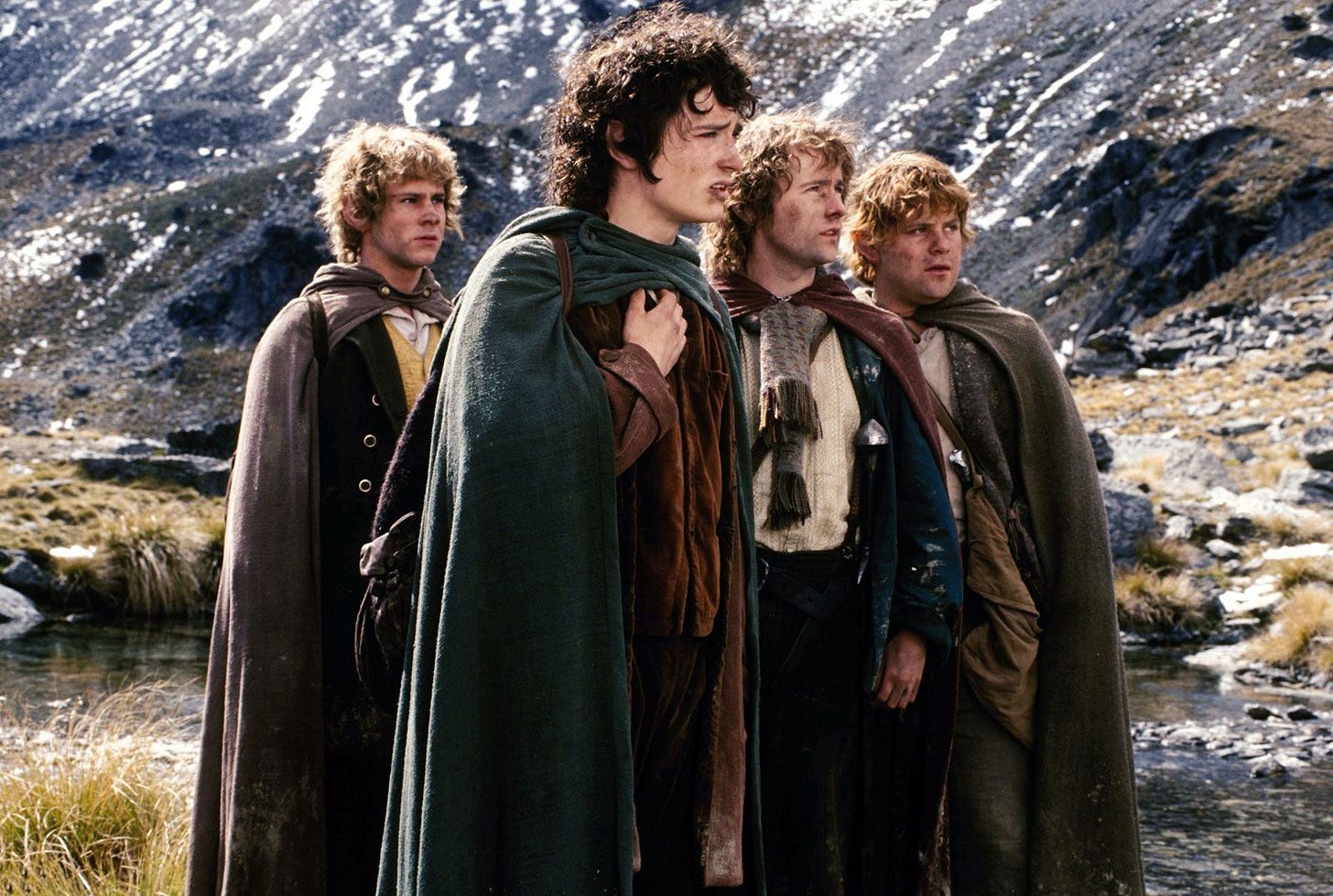

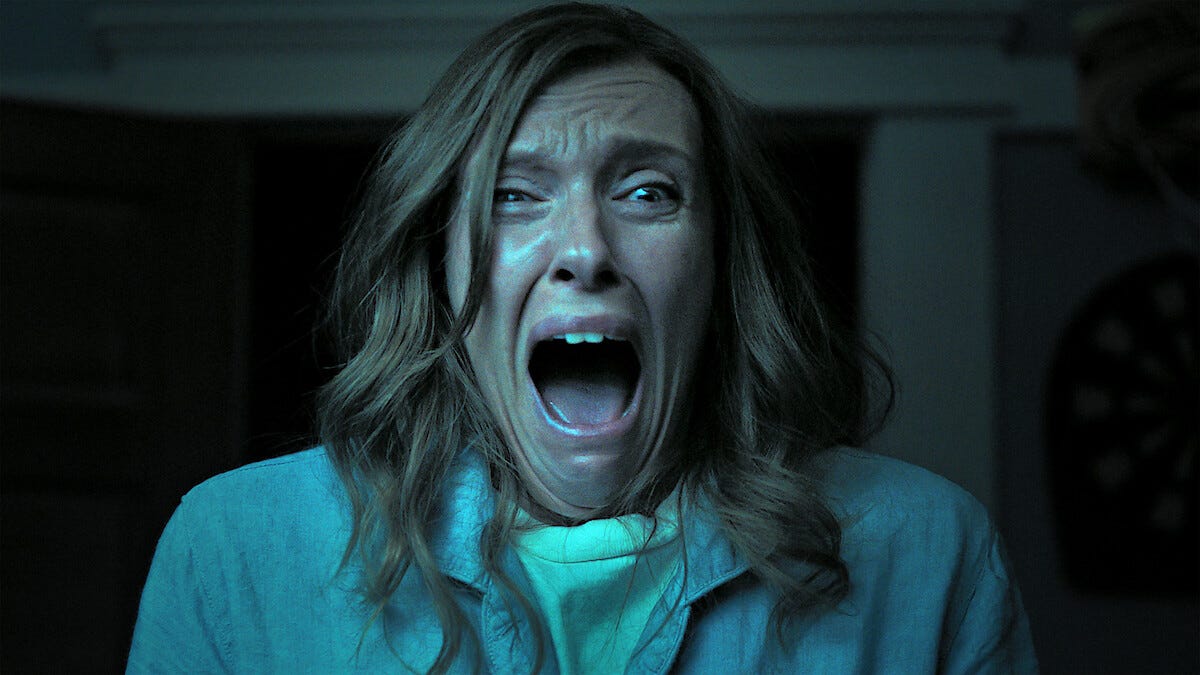
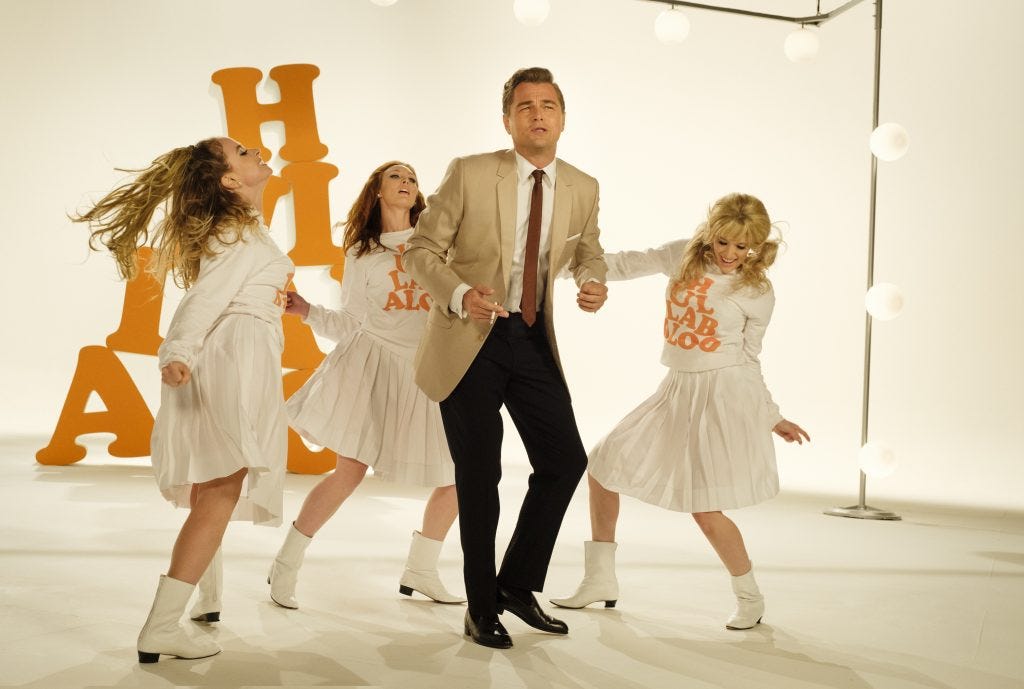
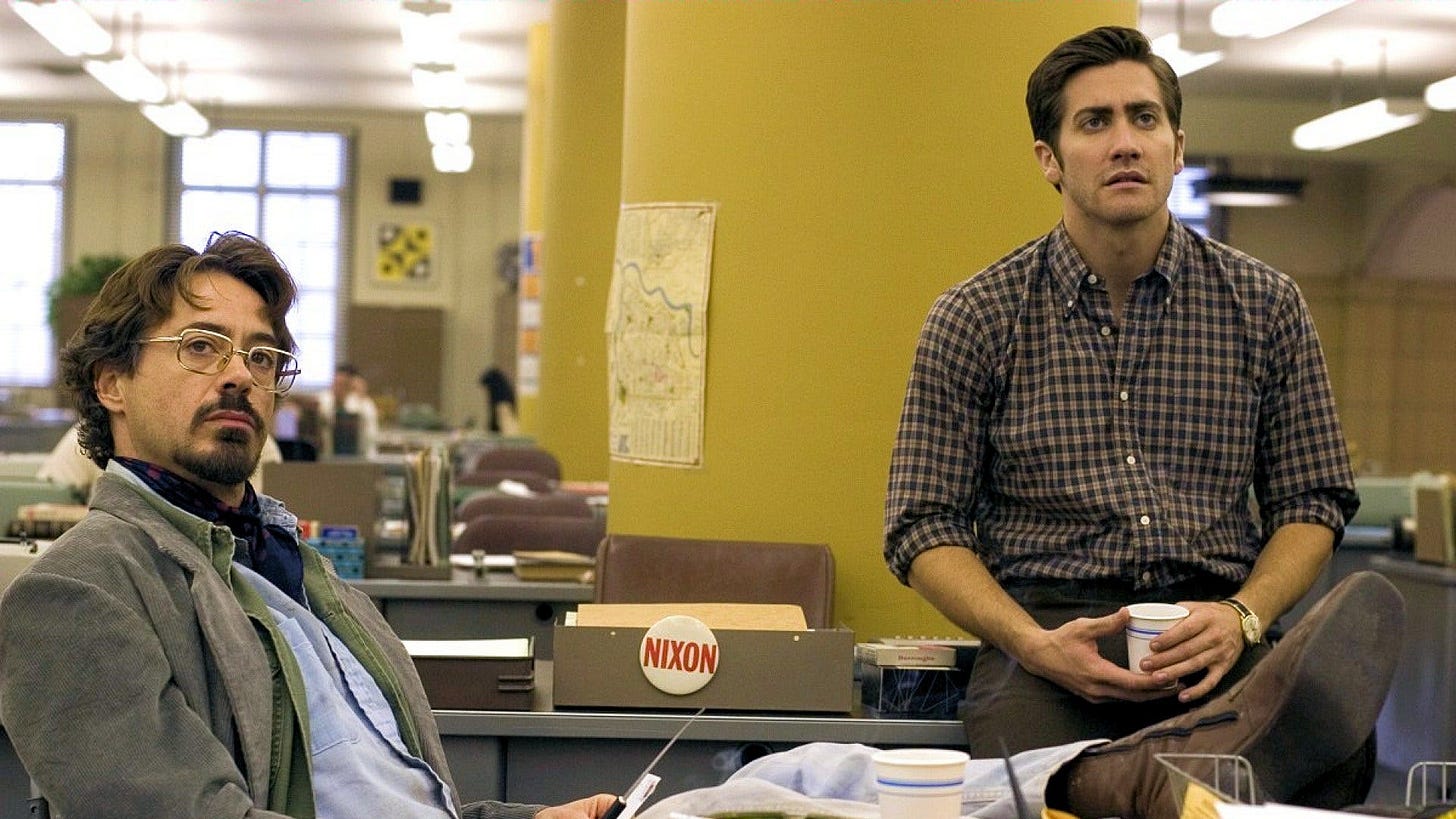
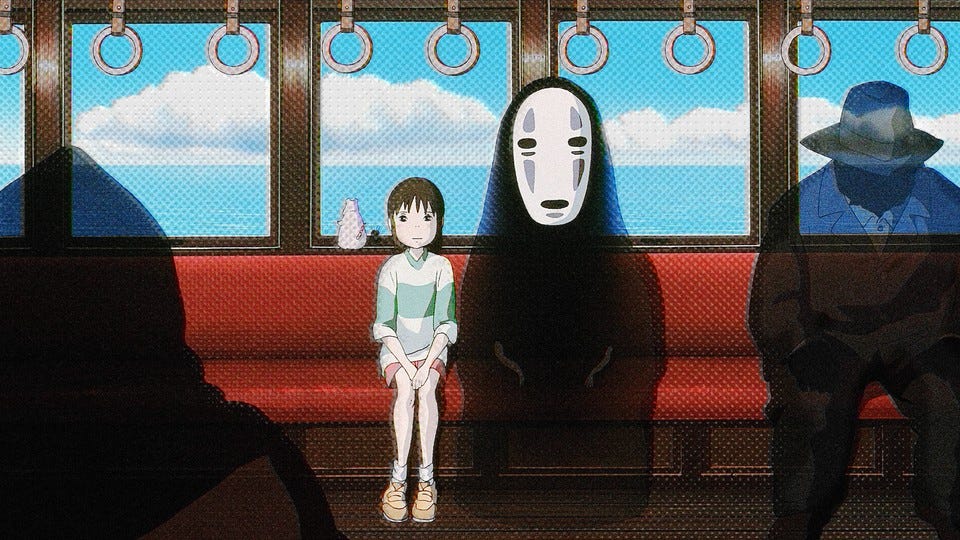
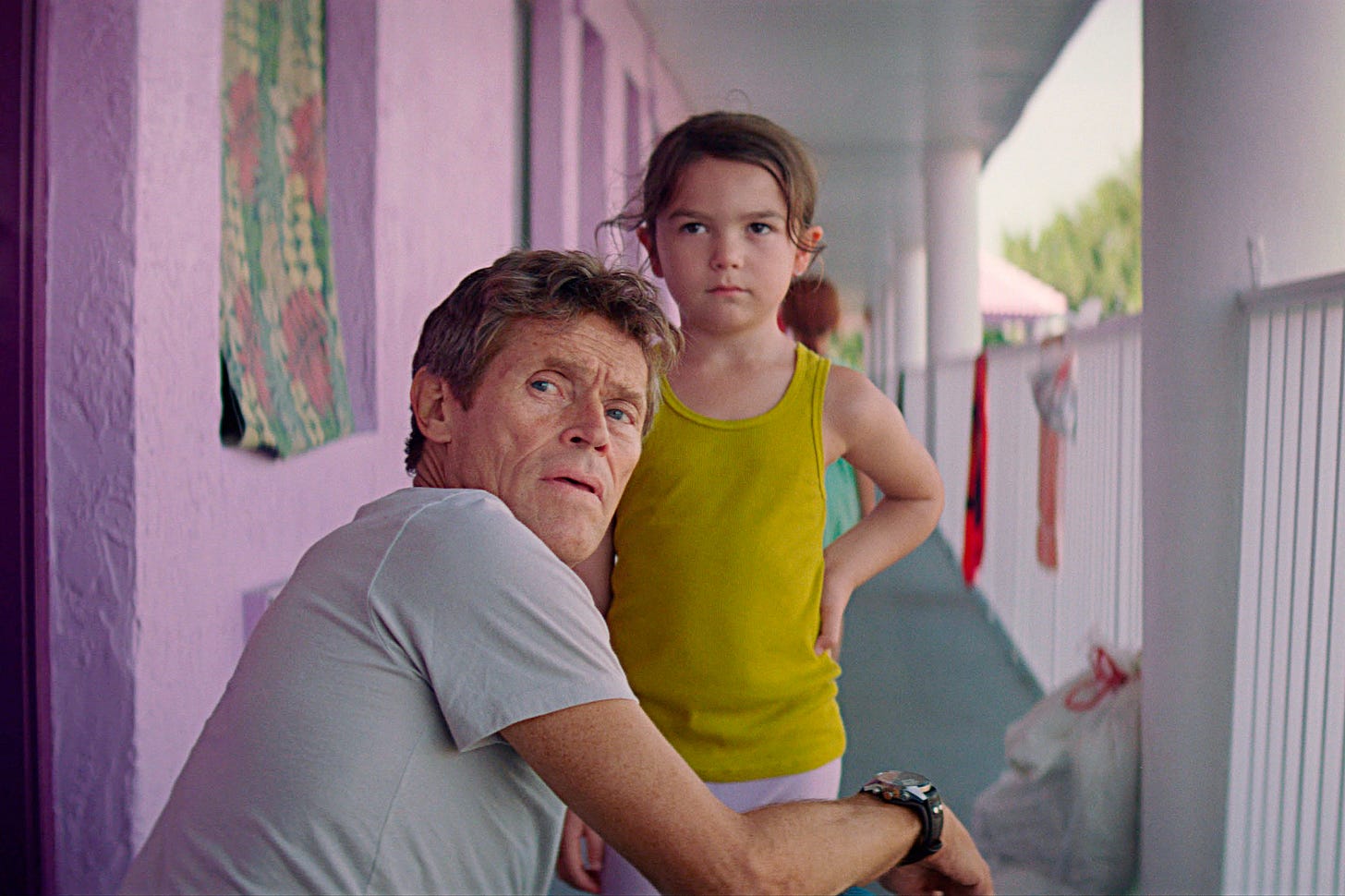
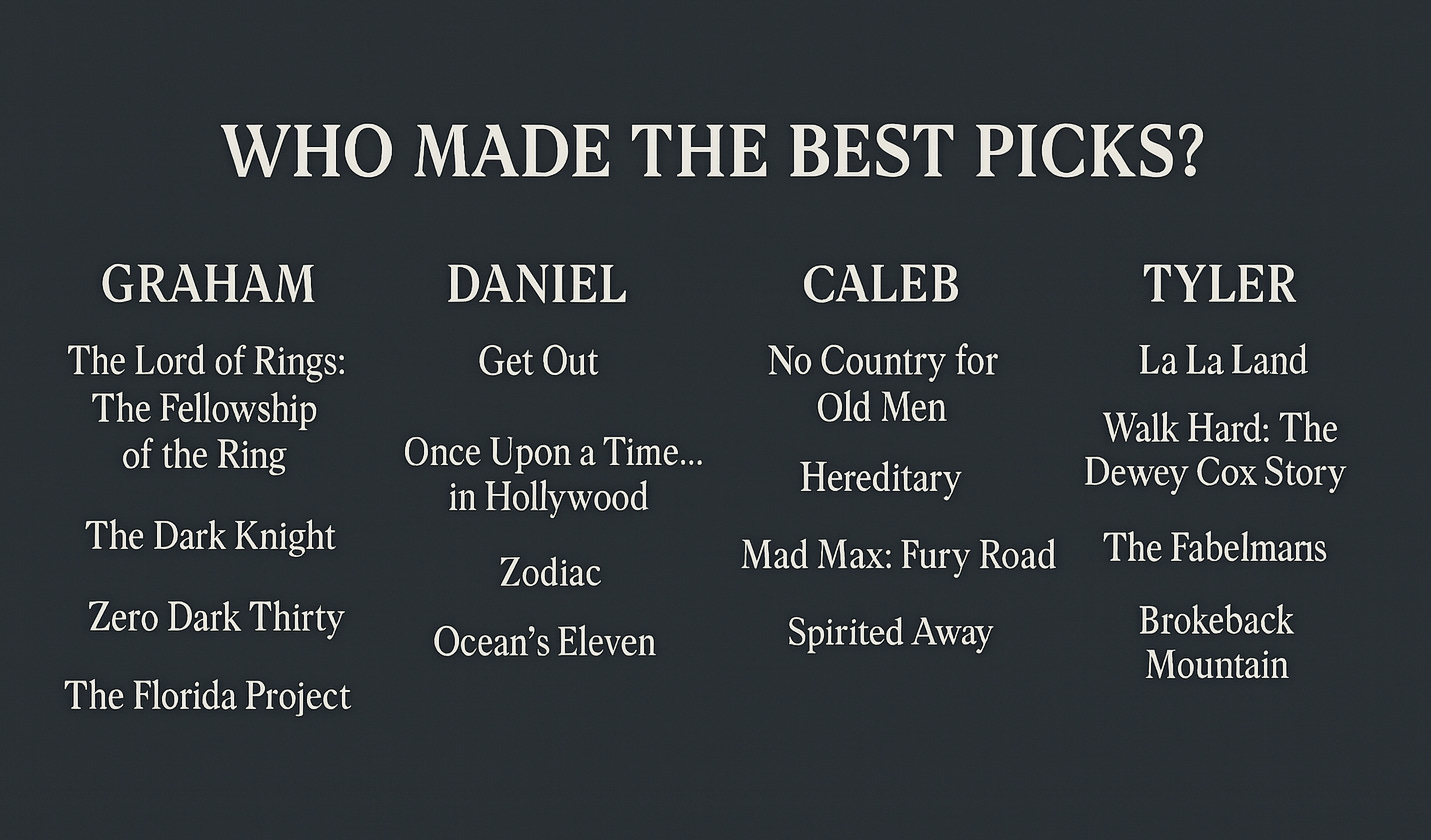
Wow! What an article! But I have to say I have only seen 3 of the films that are listed. Yikes! I’m not the movie buffs you four are, but one film is missing. It’s The Holdovers! It’s such a beautiful story that reminds each one of us the importance of being there for others.
Fury Road was included, so no notes. Nice work, gents!